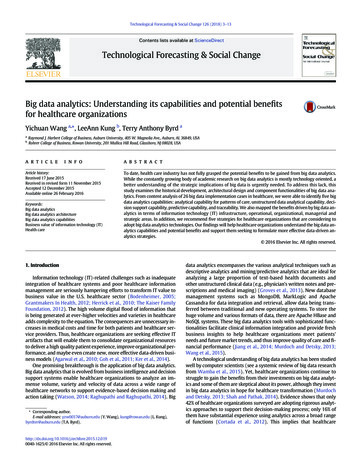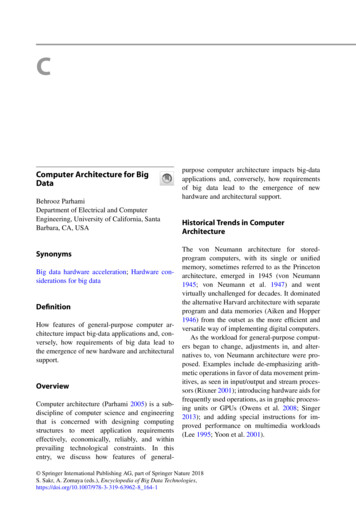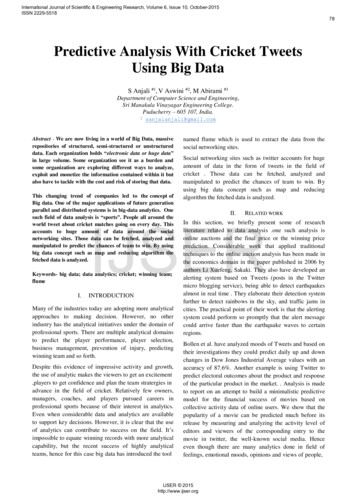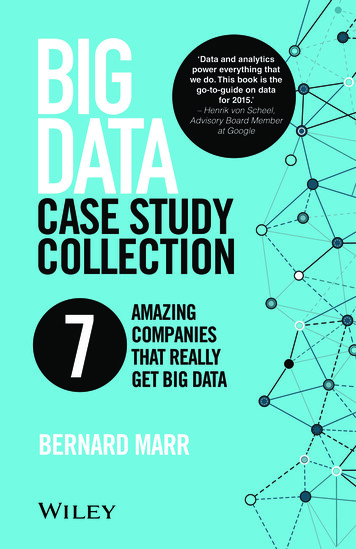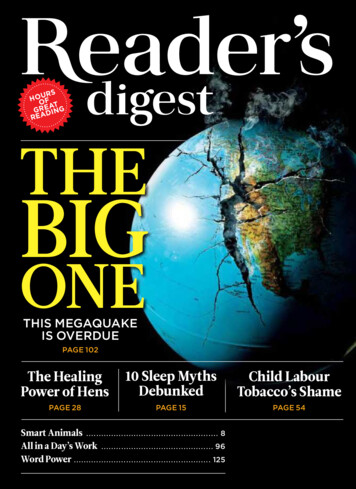
Transcription
RSHOUFO ATGREDINGREATHEBIGONETHIS MEGAQUAKEIS OVERDUEPAGE 102The HealingPower of Hens10 Sleep MythsDebunkedChild LabourTobacco’s ShamePAGE 28PAGE 15PAGE 54Smart Animals 8All in a Day’s Work 96Word Power 125
Explore, Interact,Explore,Interact, InspireInspireAvailable now, everywhereAvailable now, everywhere
ContentsMARCH 201628SocietyP.THE COMPANY OF HENSThey’re friendly, cuddly and love having agood cackle. Raising chickens is changingthe lives of lonely seniors. DAV I D T H O M A S3850 Who Knew?IN PRAISE OF TECHNOLOGYThe low-tech past was boring, says a fatherwho’s happily embracing his smartphone.A N D R E W O ’ H AG A N F R O M T H E N E W YO R K T I M E S42City SecretsSTREET SMARTIt’s the navigation test so difficult that itenlarges your brain; memorising over 25,000streets and 100,000 landmarks to do the job.R O F F S M I T H F R O M N AT I O N A L G E O G R A P H I C50Personal EssayTHE MUSIC IN MEP. 62Dancing – especially when you’re trying toimpress a new partner – is terrifying with twoleft feet and no confidence. L I SA F I E L D S54InvestigationCHILDREN OF THE FIELDSIn the US, children as young as 12 can legallytoil in tobacco fields, where they are exposedto harmful toxins. R O B E R T A N D R E W P OW E L L62PsychologyCHEWPHOBIAWhen the sounds of chomping, slurping orlip-smacking evoke extreme rage or panic.CHARLES BETHEA FROM NEW REPUBLICMarch 2016 1
ContentsMARCH 2016P. 6868Words of Lasting InterestWHY I STUDY MEMORYA neuroscientist finds three little words tobreak through her father’s dementia.D R W E N DY S U Z U K I , TO L D AT T H E M OT H7274Instant AnswersVOLCANOESThe what and how of volcanoes – and wherethey’re most likely to erupt. H A Z E L F LY N NUp CloseTHE MAN WHO SELLS EVERYTHINGStarting as an online bookseller, Jeff Bezosexpanded into food, furniture and fashion.G I D E O N R O S E F R O M FO R E I G N A F FA I R SP. 8882Drama in Real LifeBOY IN THE STREAMTwo hours after frantic rescuers pull a toddler’slifeless body from the water, only his familyand a dedicated intensive care doctor stillrefuse to give up hope. D E R E K B U R N E T T88First PersonA LOVE STORYA loving couple finds the heart to say goodbyeto each other on the tranquil shores of Italy’sLake Como. LO R E N ZO C A R C AT E R R A F R O MN AT I O N A L G E O G R A P H I C T R AV E L E R98The Stranger Who Changed My LifeTHE CURIOUS WORLD OF MRS REESETrapped in a troubled home, a young girlglimpses the promise of a better future.H E AT H E R S E L L E R S2 March 2016
MARCHBONUSREADTHEBIG ONEA devastating earthquakeand tsunami will happen.The only question is when.KAT H RY N S C H U L ZFROM THE NEW YORKERP.REGULARS4810126181114122LettersSmart AnimalsKindness of StrangersMy StoryQuotable QuotesThat’s OutrageousUnbelievablePuzzles, Trivia & Word PowerHUMOUR36 Laughter, the Best Medicine66 Life’s Like That96 All in a Day’s Work 102CONTESTS5 Caption and Letter Competition6 Jokes and StoriesTHE ovies & BooksSEEPAGE6March 2016 3
LettersREADERS’ COMMENTS AND OPINIONSVoice Mail MemoriesI never knew my phone saveddeleted voice mail until I read‘Seriously, Listen to Your VoiceMail’ (January). I lost a dearfriend this year. He loved tojoke around and would oftenleave me voice mails. I thoughtmost were gone forever.I retrieved three. They mademe laugh and cry. DANIEL SHEFFERFamily Feudsnephews. Parents, of course, have tocope with the pain of not seeing theirYour article ‘When Siblings Stopchildren together at the same time.Speaking’ (November) struck a chordI’m pleased to say that in recentwith me. We have had our own sadexperience of this. Even when siblings months, there has been a miraculousmove towards reconciliation in ourare very close while they are growingpersonal situation after many years.up, their later experience of life canSo sometimes there is hope.produce changes which can causeP.C. (NAME SUPPLIED)them to drift apart and sometimeseven become hostile to each other.While it’s true you can’t choose yourOne thing not mentioned in thefamily, you can choose to surroundarticle is the sad impact suchyourself with peoplea breakdown has uponwho love and supportthe rest of the family.LET US KNOWyou. You don’t haveCousins grow up notIf you are moved – orto please everyone.knowing one another,provoked – by any itemFamily membersuncles and aunts havein the magazine, shareshouldn’t get a freeyour thoughts. Seeno connection withpage 6 for how to joinpass.RACHEL KOZAKtheir nieces andthe discussion.4 March 2016
Swapping NotesThank you, Reader’s Digest, foranother brilliant issue. I have justspent a lovely few hours readingthe December magazine from coverto cover.I particularly enjoyed ‘Notes FromMy Father’ about emails exchangedbetween a father and son. Althoughmy own father passed away manyyears ago, I feel that contacting histwin brother via email may be a wayof getting to know what Dad was likeas a young man.BREE STAFFORDThe Whole PackageI love your magazine. Each time I’mfinished with an issue, I pass it on tofriends or family to enjoy. I’ve learneda lot about medicine and health, andthe small size is great – it’s easy tocarry in my handbag in case I findmyself in a situation where I havetime to read.DOREEN I.Hard-headedWe asked you to think up a funnycaption for this photo.They say a pilot needs a cool head.HUANG JIANQIWhen life gives you watermelons,make a helmet.SITI M. A. RAHMANTom’s dry scalp treatment didn’t costhim a cent.CHRIS ANGAnd parents say kids come from thecabbage patch.VELMA HALLCongratulations to this month’swinner, Huang Jianqi.WIN!P HOTOS: iSTOCKWIN A PILOT CAPLESSFOUNTAIN PENThe best letter published eachmonth will win a Pilot Caplessfountain pen, valued at over 200.The Capless is the perfectcombination of luxury andingenious technology, featuring aone-of-a-kind retractable fountainpen nib, durable metal body,beautiful rhodium accents, andan 14K gold nib. Congratulationsto this month’s winner, BreeStafford.CAPTION CONTESTCome up with the funniestcaption for the above photo and youcould win 100. To enter, emailrdaeditor@readersdigest.comor see details on page 6.March 2016 5
Vol. 190No. 1128March 2016EDITORIAL Editorial Director Lynn LewisManaging Editor Louise Waterson ChiefSubeditor & Production Editor DonyaleHarrison Deputy Chief Subeditor Melanie EganDesigner Luke Temby Digital Editor & HumourEditor Greg Barton Subeditors Jenny Byrne,David Levell Editorial Coordinator VictoriaPolzot Contributing Editors Kathy Buchanan,Hazel Flynn; Helen SignyPRODUCTION & MARKETINGProduction Manager Balaji ParthsarathyMarketing Manager Gala MechkauskayteADVERTISING Group Advertising & RetailSales Director, Asia Pacific Sheron WhiteAdvertising Sales Manager Darlene DelaneyREGIONAL ADVERTISING CONTACTSAsia Kahchi Liew, liew.kahchi@rd.comAustralia Darlene Delaney,darlene.delaney@rd.comNew Zealand Debbie Bishop,debbie@hawkhurst.co.nzPUBLISHED BY READER’S DIGEST(AUSTRALIA) PTY LTDManaging Director/PublisherWalter BeyleveldtDirector Lance ChristieREADER’S DIGEST ASSOCIATION, INC (USA)President and Chief Executive OfficerBonnie KintzerVice President, Chief Operating Officer,International Brian KennedyEditor-in-Chief, International MagazinesRaimo MoysaALL RIGHTS RESERVED THROUGHOUT THEWORLD. REPRODUCTION IN ANY MANNERIN WHOLE OR PART IN ENGLISH OR OTHERLANGUAGES PROHIBITED6 March 2016CONTRIBUTEFOR DIGITAL EXTRAS ANDSOCIAL MEDIA LINKS, SEE PAGE 7.Anecdotes and jokesSend in your real-life laugh forLife’s Like That or All in a Day’sWork. Got a joke? Send it in forLaughter is the Best Medicine!Smart AnimalsShare antics of unique pets orwildlife in up to 300 words.Kindness of StrangersShare your moments ofgenerosity in 100–500 words.My StoryDo you have an inspiring orlife-changing tale to tell?Submissions must be true,unpublished, original and800–1000 words – see websitefor more information.Letters to the editor, captioncompetition and otherreader submissionsOnlineFollow the “Contribute” link at theRD website in your region, or via:EmailAU: editor@readersdigest.com.auNZ: editor@readersdigest.co.nzAsia: rdaeditor@readersdigest.comWe may edit submissions and use themin all media. See website for full termsand conditions.TO SERVE YOU BETTER –OUR PRIVACY STATEMENTReader’s Digest collects your information to provideour products and services and may also use yourinformation for the marketing purposes of RD and/or selected corporate partners. If the information isnot provided you will be unable to access ourproducts or services. Our Privacy Policy at theReader’s Digest website in your region contains fulldetails on how your information is used (includingREADER’SIS PRINTEDON PEFC-CERTIFIEDhow we DIGESTmay shareyour informationwith our affiliatePAPER. THIS PROVIDES AN ASSURANCE THAT THEcompanies in the US or other overseas entities), howPAPER IS PRODUCED FROM SUSTAINABLY MANAGEDyou mayaccessor correctinformation held and ourFORESTANDCONTROLLEDSOURCES.privacy complaints process.
JOIN THECONVERSATIONFour great reasons why you shouldjoin us online We give awaycash and prizesFirst look atfuture issuesJoin funcompetitions andquizzesGet a sneak peekat upcomingstories andcoversWe givegreat adviceGet regular home,health and food tipsfrom The DigestWe must teach our children todream with their eyes open.H A R RY E DWA R D SWe help you getmotivated#QuotableQuotes and#PointstoPonder to get youthrough the day
Smart AnimalsWonderful stories of behaviour that seems so humanOne night we went outside to make sure the animals were all fine. The ducks andchickens were OK. I went to check on the baby rabbits and I saw their mother inthe outside run, nibbling on some cabbage.I shone my torch in the hutch where the babies were sleeping. There, sittingon top of them like a big, proud, fluffy hen was our rooster, Mr Ancona. He hadhis wings spread carefully over the rabbits, keeping them warm.The funny thing about it is that he is a rooster and, even if he thought he wasa hen, they were still rabbits!Special DeliveryLINDA BUHSEMany years ago we had a lovely catnamed Minx, who was pregnantwhen she came into our lives. She’dbeen a stray in the warehouse where Iworked and was different from other8 March 2016cats we owned. Minx was happy aslong as we were around – she’d evengo sailing with us. If she accidentallyscratched us when playing, she wouldlick us as if to apologise.There was an old stray cat in ourneighbourhood and Minx alwaysI L LU ST R AT E D BY E DW I N A K E E N EA Clutch in a Hutch EMILY DEE
left some of her dinner for him. Herbest friend was a cocker spaniel,and she would wait for the dog eachday outside our front gate. When theowner walked the dog, he wouldwait while they rolled around,played a bit and groomed eachother. At night, she was alwayshappy to wait for her dinner as longas we gave her a pat and a cuddle.As Minx’s delivery due date drewcloser she began looking for placesto give birth. I cleaned out thebottom of my wardrobe, put somerags down and showed her the littlebed I had made for her. After a shortinspection, Minx purred, rubbedmy leg and continued on her way.I thought there would be little chanceof it being suitable but I always leftthe door ajar just in case.One night soon afterwards, myhusband and I had beenout late and were chattingin the kitchen whenshe came in,meowed andtrotted out again.We thought it strange, butkept talking. Once more shecame in, meowed and left.After a third time, werealised she wanted us tofollow her. She led us to my wardrobewhere, with lots of loud purring, shepresented two tiny new kittens. Shebrought the pair out of the wardrobeand placed them at our feet. She wasa very good mum.Sibling RivalryANNIE SMARTIt’s interesting how you can get suchdifferent types of siblings amongboth animal and human families.In 1994, two brother-and-sisterChihuahua/Maltese terrier crossesnamed Scamper and Feebee joinedour family. The sister, Feebee, wasthe ‘dumb blonde’ and her brotherScamper was the ‘smart cookie’.Feebee loved her bones but Scampercould take them or leave them.Even so, Scamper loved to outsmartFeebee and take her bone just forthe fun of it. One day, however,I caught him out.Feebee would always bark madlywhenever someone walked past ourhouse. This day, when they were twoyears old, Scamper suddenly ran tothe front fence barking at no-one.Feebee jumped up from her spot inthe backyard, leaving the bone shewas enjoying, to joinin with the barking.Scamper then ranback to Feebee’s boneand took it!He had no realinterest in it, just the fun ofstealing it. Although he seemedto always get the better of hisbig sister, they played togetherbeautifully for the most part.You could earn cash by telling us aboutthe antics of unique pets or wildlife. Turnto page 6 for details on how to contribute.March 2016 9
KINDNESS OF STRANGERSCaught up in my fogof dissatisfaction, ittook a total stranger toteach me to be thankfulfor my good lifeA Change of Heart10 March 2016BY A NNE TIE RNANIT WAS ONE OF THOSE DAYS, an ordinary October day in2014. I woke up weary and all of the routines of life werechores, the people in it irritants. I wasn’t feeling any senseof gratitude for my comfortable home or lovely family.I dropped my two older children at school with a senseof relief and reluctantly headed to the supermarket to buygroceries with my youngest.I was feeling resentful at having to go in the first place(why do they have to eat?) and my son, just four years oldat the time and responding to my mood, was being difficult.I raced around with the trolley, thoughtlessly tossingitems in with no regard to cost, while trying to control myerrant child whose behaviour had now descended intocomplete obnoxiousness. Yes, I was that mother, growling,PHOTO: iSTOCKAnne Tiernanlives inTauranga,New Zealand,and has threechildren agedfive, seven andnine. She isIrish and mether Kiwihusband whenthey workedtogether inDublin. Sheloves theoutdoors andtravelling.
cajoling, threatening, despairing ata small child. The kind of behaviouryou see in others before you havechildren and think, I will never be oneof those people.We eventually made it to thecheckout, and stood in the queuewaiting our turn. After a short time, Inoticed that someone had joined theline behind us. I turned around andsaw an old man. He was stooped overand wore a dirty overcoat, tied aroundthe middle with rope. His shoes weresplit and his trousers flapped aroundsockless ankles on this cold, wet day.In his hands he carried a small cartonof long-life milk.As I had a trolley full of groceries,I asked him if he’d like to go aheadof me. It wasn’t an act of kindness onmy part, rather an automatic reaction,ingrained in me since childhood fromthe times I went shopping with mymother. Perhaps I just did it out ofa sense of obligation or guilt. PerhapsI just wanted him gone. After all, hispresence made me uncomfortable,in the same way I feel uncomfortableand avert my eyes when passing ahomeless person.He looked shocked and uncertain.“No, I couldn’t possibly, are yousure? How kind of you,” he stuttered.Reluctantly, he went ahead, paid forhis milk, and took his change.Then, to my amazement, he turnedto my little boy and gently pressedthe change into his hand. I protestedthat it wasn’t necessary but he wasinsistent. And my son, who had upto this minute been a thorn in myside, smiled his most beautiful smile,looked at this stranger frankly, andwithout judgment or hesitation, bearhugged him around his grubby legs.The man gave a sheepish, gummysmile, then shuffled off, turning againto say thank you and wave.I wondered at his life and at hisreaction. Was he so rarely shownany humanity? Did he feel he neededto pay for being acknowledged?I felt shame at my earlier self-pity.This humble, kind stranger had mademe resolve to be more thankful – andmade my little angel skip out of thesupermarket with joy.I never saw the man again but Ithink about him often.Share your story about a small actof kindness that made a huge impact.Turn to page 6 for details on howto contribute and earn cash.March 2016 11
MY STORYMy mother never lost her love of murder mysteriesby Ruth Rendell, even as her eyes dimmedReading CompanionAfter workingin publiclibraries formore than 30years, DianeDavidsonhopes to retirethis year anddreams ofwriting a book.She loves tocook, whichshe does well,and garden,which she saysshe does badly.12 March 2016IN THE 1950s, as the only child of a divorced mother, living ina modest two-roomed cottage on my aunt’s property in ruralPapakura, New Zealand, there was no TV and very little moneyto spend on entertainment, holidays and other treats. But wehad our books and enjoyed nothing better than reading aloudto each other. My mother read me The Faraway Tree stories,Alice’s Adventures in Wonderland, then, even better, Throughthe Looking-Glass. She read me Treasure Island, Anne of GreenGables, and poetry as well. When I turned seven, I was able totake my turn at the reading role, and we spent many pleasantevenings laughing over the antics of storybook characters.In 1964, I was 18 and eager to ‘fly the coop’ so I left hometo live in a flat with a school friend in Auckland. Caught up ina social whirl of parties, music and boyfriends, I had little timefor reading. I married one of those boyfriends and we had twosons. My children loved visits to their doting grandmother. Sheand I regularly phoned each other and talked books together.Mum loved to buy children’s books for my sons and for thetwo daughters we later adopted. Every year they got a RupertBear annual or a beautifully illustrated book of fairy tales.Gradually, Mum’s eyesight began to fail. She found itincreasingly difficult to read the small print of her belovedbooks. She enjoyed looking at magazines but missed keepingup with the latest releases of her favourite authors.PHOTO: ISTOCKBY DI A N E DAV I DSO N
PHOTO/ILLUSTRATION CREDITWith all my kids off to school, Irejoined the workforce and got thejob I always wanted in ourlocal library. I became aSpecial Needs libraryassistant and one of my taskswas to select books for visuallyimpaired patrons. I was alsoinvolved in the home deliveryservice to house-bound members.It was a great pleasure to visitthese people and talk about theirinterests and their favouriteauthors – then return withlarge-print novels and nonfiction audiobooks. I alsoenjoyed suggesting newauthors and finding subjectsthat might interest them. Thesefolk were always so pleased tobe able to access this material.In time, I introduced mymother, first of all, to the largeprint section, then eventually toaudiobooks, which gave her agreat deal of joy as her eyesightgrew more dim.In her 70s, Mum’s choice ofreading seemed to narrowdown to mainly murdermystery stories and theoccasional western. I wassad to see that she no longerMarch 2016 13
M Y STO RYwanted to learn about the wonderfulworld she lived in. She had alwaysshown a keen interest in what shecalled “faraway places with strangesounding names”, the animal kingdomas well as current news and views.While she said she no longer reallycared so much about all that, I felther reading experience would beenhanced if she had something morestimulating. As an experiment, I addedsome more ‘worthy’ titles in one of herweekly orders, slipping a four-discaudiobook on travel in the Andesbetween the new Ruth Rendell and aP.D. James. The next day as we droveto the supermarket, I asked, “How areyou getting on with that latest book?”She fixed me a knowing stare. “Oh,not so well,” she replied dryly. “Butit might get better. You never know,they might get out their guns and shooteach other!”I didn’t try to ‘improve’ my mother’sliterary taste after that.Ruth Rendell – especially when shewrote her psychological thrillersunder the name Barbara Vine – was agreat favourite that we shared. I wouldoften read the text version while Mumlistened to the recording so we couldcompare notes along the way. Weadmired the literary style of TheBridesmaid. It depicted an ethereallooking but criminal young womanwho turned her limpid gaze on herbesotted swain and casually suggested“We should do a murder”. Whenreading King Solomon’s Carpet, we14 March 2016both knew that the boy Damon whotrain-surfed through the LondonUnderground was in danger of comingto a sticky end. We agreed that RuthRendell didn’t seem to have a highopinion of her male characters. Theywere either knaves or fools. Wethought she did ‘nasty’ very well.A few years ago Mum suffered amassive stroke. I went with her in theambulance to hospital, sat at herbedside for three days until she died,never having regained consciousness.My life-long friend, my readingcompanion, my dear mother wasgone. Ruth Rendell continued to writebooks that appeared under both hernames. I read Portobello, The Child’sChild, The Girl Next Door and finallyDark Corners. It was just so sad not tohave the benefit of Mum’s enthusiasticopinion to compare notes with.Then, last year, at age 85, RuthRendell passed away, too. It wasreported that she, like my mother,had succumbed to a stroke. I’ll missher regular new releases. For me andfor my mother, Ruth Rendell was theMistress of the Mystery.There are still so many things I’d liketo tell Mum. I’d like to thank her forher early guidance in the wonderfulworld of books. And I’m happy to say,that I’m also into audiobooks now.Do you have a tale to tell?We’ll pay cash for any original andunpublished story we print. See page6 for details on how to contribute.
THE DIGESTHEALTH8MYTHSABOUTSLEEPWe debunk commonuntruths to help you geta good night’s restPHOTO: iSTOCKMYTH You must sleep rightthrough the night.REALITY No-one sleeps all nightlong. Even people who feel they sleepwell wake about 30 times a night –with these periods of arousal lastingno more than three minutes each andhaving no effect on the restorativeaction of sleep. Problems only beginwhen we are repeatedly aware ofbeing awake and find ourselvesunable to get back to sleep.MYTH You must get eight hours.REALITY According to the AustralianSleep Health Foundation, most adultsneed on average between sevenand nine hours a night, while somepeople’s individual requirements falla little outside this range.March 2016 15
8MYTHS ABOUT SLEEPMYTH The best sleep is beforemidnight.REALITY Rather than the clockstriking 12, we should look to ourinternal biological clock’s idea ofmidnight. In other words, it’s best toget some sleep before the point in thedaily cycle where the body is runningat its slowest pace. This ‘biologicalmidnight’ occurs not at 12am, butsomewhere between 3am and 4am.The average sleeper will have beenasleep for 4–5 hours before reachingthis point. This ensures that a greaterproportion of the night’s deep-sleepphases – where our recovery processesare especially effective – occur beforethis low point.MYTH A full moon disturbs sleep.REALITY A surprising number ofpeople believe that a full moon hasan effect on their sleep. However, datagathered by sleep scientists shows thatthis is simply not the case.MYTH Exercise in the evening helpsyou sleep.REALITY This myth originates inthe fact that being physically tireddoes indeed help you sleep. Yetexercise serves to stimulate the bodyand increase body temperature, soexercising just before you go to bedis not a good idea. Allow your bodyto rest for at least two hours afterexercise before going to bed. Thesame goes for focused mental activity.MYTH Older people needsignificantly less sleep.REALITY Large normative sleepstudies show that older peopleaverage around seven hours’ sleep pernight. From the age of 30 onwards, wewake up more often due to biologicaland hormonal changes as we age.MYTH The bedroom should be cold.REALITY To ensure a good night’ssleep, keep your bedroom at around18 C. However, choose appropriatecovers or use a hot water bottle asbeing too cold can prevent you fromgetting a good night’s sleep. Thatdoesn’t mean you should shut thewindows tight, though, as stale airwith lower levels of oxygen will tend toimpair the restorative effect of sleep.16 March 2016MYTH TV helps you sleep.REALITY Despite the fact that manypeople nod off while watching TV, thetruth is that the sound and flickeringlight reach the brain even after wehave fallen asleep, preventing us fromachieving healthy deep sleep. Devicessuch as laptops, tablets and phonesare even worse. They make noises andgive off light and you’re tempted tocheck them.For more on a goodnight’s rest, see Secretsof Healthy Sleep,published by Reader’sDigest, from www.readersdigest.co.nz/healthy-sleep
HEALTHNEWS FROM THEWorld of MedicineRosacea Caused by Geneticsand Lifestyle FactorsDon’t just blame your family treefor that red, thick, pimply skin.Your habits play a big role, too.In a University Hospitals CaseMedical Center (Cleveland, Ohio)study, 275 pairs of twins took lifestyleand medical surveys and underwentskin screenings. Genetics contributedto 46% of rosacea risk, while the restwas due to environmental factorssuch as sun exposure and alcohol.PHOTO: A DA M VOORHESCar Sickness BreakthroughBritish researchers tested a device thatdelivers a mild electrical currentto the scalp (it feels like a brieftingle) on 20 volunteerswho sat in a spinningchair designed to inducemotion sickness. Thosewho received the currentbefore taking a secondride took longer to get sickthan before. The currentdampens responses in thebrain region that processesmotion signals. A devicemight be developed for usein boats and cars in as littleas five years.Sadness Makes You See GreyIn a Psychological Science study, 127participants watched either a sad filmor a comedy skit and then indicatedthe colour of patches that hadbeen de-saturated to more neutralshades. Sad people had a difficulttime discerning shades on the blueyellow axis. Related research haslinked perception of these coloursto dopamine, the brain’s feel-goodneurotransmitter that’s low whenyou’re feeling down.Dizziness After StandingMay Signal Bigger IssuesWhile the occasional dizzy spell afterstanding for a few minutes iscommon, it’s a good idea to tellyour doctor if you experience itoften.According to a studyfrom Harvard MedicalSchool, the cause ofthe dizziness may beorthostatic hypotension(OH) or the sudden dropin blood pressure due topositional changes and otherfactors. Other causes includediabetes, dehydration and inner earproblems.March 2016 17
HEALTHFive Simple Strategies toPrevent and Ease Back PainLifestyle changes to keep your back in good condition1. BALANCE YOUR DIET Somefoods can have anti-inflammatoryeffects that help ward off back pain.Back-friendly foods include cherries,olive oil, salmon, mackerel, albacoretuna, linseed (flaxseed), walnuts, soyproducts, nuts, green tea and ginger.On the other end of the diet spectrum,some foods can contribute to pain:processed foods, sunflower oil,margarine, products containing highfructose corn syrup and foods high insaturated fat and trans fats.2. LET THE SUN SHINE A lack ofvitamin D, the ‘sunshine’ vitamin,may contribute to back pain. In onestudy, more than 80% of peoplebetween 15 and 52 with chroniclow-back pain, were deficient inthe vitamin. Some nutrition expertssuggest taking 1000 IU of D3 daily.3. EDIT YOUR WALLET Sitting ona fat wallet all day tweaks the spineand can compress a crucial nerve inthe buttocks. That can cause sciatica– inflammation of that nerve. Thisproblem is so common among menthat it has a name: wallet neuropathy.18 March 20164. TURN UP THE HEAT Whenback pain strikes, try treating itwith a wearable heat wrap ratherthan ibuprofen or paracetamol.These pads provide 40 C heat forup to eight hours. Also, one studypublished in Spine found they supplymore relief than the maximum doseof nonprescription pain relievers –and with longer-lasting effects.5. DO A LEG CHECK When sittingat your desk, put a footstool orsomething like a largebook under your feetso your knees areslightly higherthan your hips, toease pressure onthe lower back.
Keep Your Ears Happy1. TACKLE EARWAX You producemore earwax as you get older and toomuch can muffle sounds (a commoncause of hearing loss). Ears are selfcleaning as long as the wax doesn’tharden. If it does, put a drop or twoof olive oil in your ear overnight tosoften it (protect yourpillow with a towel).2. TREAT SNORINGIf you or your partnersnores, take action toresolve it and wearearplugs to bed. Atclose range, snoringcan reach 90 dB –louder than a roaddrill. In one smallstudy at Queen’sUniversity, Canada,all four bed partnersof chronic snorers hadnoise-induced hearing loss in one ear– the one nearest the snorer.P HOTOS: iSTOCK3. CUT DOWN ON SATURATED FATIt raises cholesterol levels, which canworsen atherosclerosis and acceleratehearing loss due to reduced bloodflow to the inner ear. When doctorsat the Hospital El Bierzo in Spain,tested 180 people aged over 65 withhearing impairment, they foundthat those with high cholesterol hadsignificantly worse hearing loss.4. GET ENOUGH EXERCISEScientists at Miami University in theUS, have shown that two monthsof aerobic exercisetraining in relativelyunfit volunteersincreased hearingsensitivity as well ascardiovascular fitness.Don’t exercise whilelistening to loud music– apart from the noiselevel itself, Swedishscientists have shownthat combining loudmusic with exercisemay increase hearingdamage.5. MAINTAIN A HEALTHY DIETA study of 2111 people aged 49 to 99at Vanderbilt University in the USrevealed those whose diets includedmore foods rich in vitamin C,vitamin E, riboflavin (a B vitamin),magnesium and lycopene (found inhigh concentration in tomatoes) hadbetter hearing. Oily fish also seem toconvey protection for hearing.March 2016 19
FOODWelcome to our newfood pages with a freshrecipe every issue, plustips and top ideas forstress-free cooking!SALADSMiddle Eastern SaladPrep
March 2016 1 Contents MARCH 2016 P. 62 Society 82 THE COMPANY OF HENS They’re friendly, cuddly and love having a g



